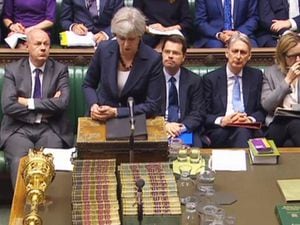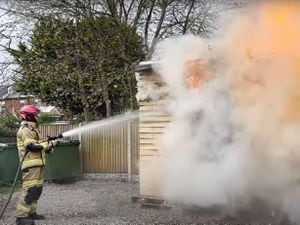Here’s why Tory MPs who want the public sector pay cap scrapped voted against Labour’s amendment
MPs including Heidi Allen, Sarah Wollaston and Johnny Mercer have given their reasons.

On Wednesday, a Labour call to end the public sector pay cap was defeated in the House of Commons by 309 votes to 323.
All 10 DUP MPs voted with the Tories to block a Labour amendment aimed at ending the cap, which is currently due to remain in place until 2019/20.
While 323 MPs voted against the amendment, a few in particular have been singled out for vitriol online.
— Nancy Strang (@mabeloo) June 28, 2017
Heidi Allen, the MP for South Cambridgeshire since 2015, received a lot of attention a day before the vote when she called for public sector funding to “urgently” be reviewed.
Referencing the £1.5 billion made available by the Treasury for the DUP, Allen said funding for schools and social care as well as public sector wages, across the whole UK, needed to be assessed.
— Heidi Allen (@heidiallen75) June 27, 2017
The Labour amendment said: “(MPs) respectfully regret that the Gracious Speech fails to end cuts to the police and the fire service; commend the response of the emergency services to the recent terrorist attacks and to the Grenfell Tower fire; call on the Government to recruit more police officers and fire-fighters; and further call on the Government to end the public sector pay cap and give the emergency and public services a fair pay rise.”
Allen, who voted against the amendment, said that she couldn’t vote in favour because of “additional incorrect statements” it contained, particularly regarding the Grenfell Tower fire.
— Heidi Allen (@heidiallen75) June 28, 2017
Allen described the amendment as “too partisan”, and told the Huffington Post: “Public services includes the very highest paid chief executives, managers, Whitehall chiefs too.
“I cannot support a blanket pay rise to all of those.
“We need to focus on those public sector workers such as nurses, healthcare assistants and all those on the front line.”
Sarah Wollaston, who was chairwoman of the Health Select Committee in the last parliament, called for cross-party working to do “something about public sector pay and improve the retention in our workforce across health and social care”. She cited the cap’s affect on morale as one of her reasons for wanting the restraint to be “loosened”.
— Sarah Wollaston (@sarahwollaston) June 28, 2017
But despite arguing both in Parliament and online for a “fair pay settlement” and the Government to think again about the cap, Dr Wollaston also voted against.
In a blog post, she wrote: “I agree with the pay review body that there are also costs in ignoring the need to increase pay.
“I believe it is time for a rethink but it will require a clear plan from the Treasury as to how it will be paid for. Ending the pay cap won’t happen through a simple amendment to the Queen’s speech.”
She added: “We have a responsibility to level with the public and with each other because the reality is that we are all going to have to pay more to put the NHS, social care and our other valued public services on a sustainable long term footing.”
Many feel the opportunity to end the cap came on Wednesday.
— Mark Ellis (@markcellis) June 29, 2017
— Heather (@heatherindorset) June 29, 2017
The pay of nurses, police and other public sector workers was frozen for two years in 2010 – and has been followed by years of 1% caps on annual rises.
Royal College of Nursing general secretary Janet Davies said of the vote: “This is a bitter disappointment for nurses and others in the public sector.
“At lunchtime, there were signs the Government was listening to our calls, but by the evening they voted to keep the pay cap in place. Our members’ ‘summer of protest’ campaign continues.”
— The RCN (@theRCN) June 29, 2017
“But we also know that a growing number on the Government’s own benches agree the cap should be scrapped. We will continue to build cross-party support this summer,” she added.
“If the Prime Minister intends to address pay in an autumn Budget, she should do so without delay.
“The pay cap stands in the way of filling the 40,000 vacant nurse posts in England. When NHS and care services are short of safe staffing, patients pay a heavy price.
“It is welcome that the Government has said it will listen to the Pay Review Body’s evidence, but they must also act on it.”
— Johnny Mercer MP (@JohnnyMercerUK) June 28, 2017
Tory MP Johnny Mercer described the vote as a political “game”.
“I think this is an attempt to vote down the Queen’s Speech to bring more instability when you need stability in the national interest,” he told the Plymouth Herald.
“I am interested in the results, and I will lobby hard to end the public sector pay cap. But we have got to get the Queen’s Speech through. I won’t vote with Labour.”
A Downing Street source had fuelled speculation that the Government would be voting to scrap the cap when it said ahead of the vote that the “public sector pay restraint is one of the tough choices we’ve had to make to balance the books after Labour’s crash and what was left behind.
“We are working through and looking at recommendations from pay review bodies that are coming.”
— Robert Peston (@Peston) June 28, 2017
Unison general secretary Dave Prentis said: “The Government’s rejection of the proposals to end the pay cap is an insult to paramedics, nurses, teaching assistants, care staff and all public sector workers.
“Ministers have spent the last few months praising public sector workers. This vote was their chance to show they really mean it.
“But the message is clear – the Government doesn’t value them enough to give them a wage rise.
“Workers have had enough of this and so have the British public.”





